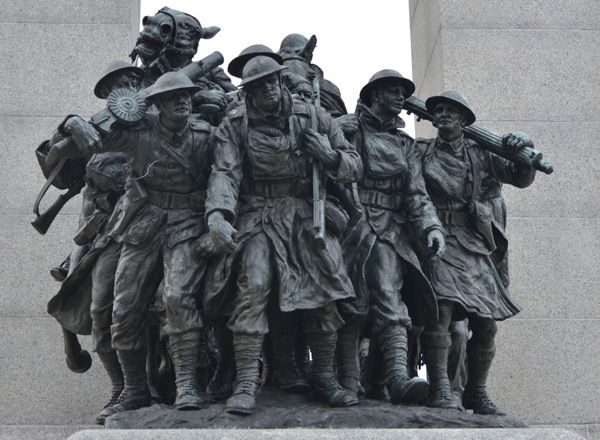War and Sacred Blood
This blog is all about “seeing the good in the world’ and not focusing on the terrible. We have the nightly news to handle that for us. So, to have a post with the words “War’ and “Blood’ in the title seems a bit of a contradiction. Hopefully, you’ll hear me out on this one.
On this Presidents’ Day here in the U.S.A., I find myself reflecting not only on the lives of George Washington and Abraham Lincoln, but on our country as a whole, where we came from, where we are and how we got here. It hasn’t been a perfectly straight road. There’s been bumps and bruises along the way, yet somehow we’ve managed to not only survive, but to grow and prosper.

Base of the National War Memorial — Ottawa, Canada
One thing we certainly have not gone without is war. Born in conflict, this country has survived in a world where man has learned evermore powerful and effective ways of killing his fellows. Though sometimes (but rarely) necessary, war is a terrible thing that leaves scars on victor and vanquished alike.
Visiting a war memorial or cemetery can be a near-spiritual experience, as one is forced to contemplate the value of freedom and the offering and sacrifice that has been laid over and over again on its alter.
Next, visit the war memorial of an ally in their country. It provides an important reminder that the price has not been paid solely by our own countrymen.
However, for the most sobering of experiences, visit the war memorial of an enemy. I’ve done this before. I’ve stood in a little village looking at a plaque listing the names of the men of that village and the surrounding countryside that were killed by my country or its allies.
Enemies are people whose story you haven’t heard, or whose face you haven’t seen.
Irene Butter
The land may heal and yesterday’s enemies may become today’s allies. Yet, the lives lost can never be replaced. So, why do we still do it?
At our best, it is because there are some things worth fighting for.
When you have the opportunity, if it hasn’t presented itself already, go and stand on the battlefield at Gettysburg. This three-day battle in early July 1863, resulted 51,000 casualties and loses. And, it was the turning point in the American Civil War, a war fought over slavery and states’ rights.
There, standing on the green, you can feel the red blood flowing from a thousand wounds. Somehow, it’s made the land sacred—almost holy. It’s probably best summed up by Abraham Lincoln’s Gettysburg Address, which brings us full circle.
Four score and seven years ago our fathers brought forth on this continent, a new nation, conceived in Liberty, and dedicated to the proposition that all men are created equal.
Now we are engaged in a great civil war, testing whether that nation, or any nation so conceived and so dedicated, can long endure. We are met on a great battle-field of that war. We have come to dedicate a portion of that field, as a final resting place for those who here gave their lives that that nation might live. It is altogether fitting and proper that we should do this.
But, in a larger sense, we can not dedicate — we can not consecrate — we can not hallow — this ground. The brave men, living and dead, who struggled here, have consecrated it, far above our poor power to add or detract. The world will little note, nor long remember what we say here, but it can never forget what they did here. It is for us the living, rather, to be dedicated here to the unfinished work which they who fought here have thus far so nobly advanced. It is rather for us to be here dedicated to the great task remaining before us — that from these honored dead we take increased devotion to that cause for which they gave the last full measure of devotion — that we here highly resolve that these dead shall not have died in vain — that this nation, under God, shall have a new birth of freedom — and that government of the people, by the people, for the people, shall not perish from the earth.
Let us today find a way to continue their work in our own way for our own time.